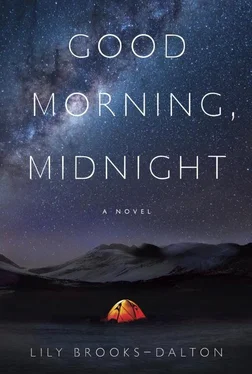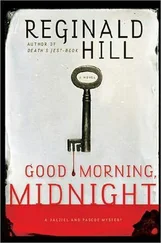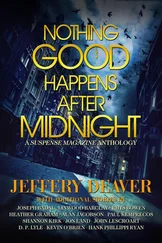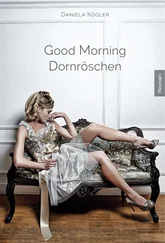He swung his feet to the floor and let his torso hang in his lap, head in hands, while the dizzying black clouds seeped away from his vision and he recovered his balance. He closed his eyes until his head stopped spinning and found a sense of stillness; when he opened them, Iris was in front of him, in the chair she had sat in throughout his illness, keeping watch over his fevered body. She blinked at him and didn’t say anything.
“Where did you come from?” he asked. “Have you been there long?”
She nodded and continued to look at him, a blank stare on a beautiful face. He struggled to understand what he had known all along. His head ached from it.
“Why are you here?” he whispered. Iris cocked her head and lifted her shoulders as if to say You tell me. Augustine pressed the heels of his hands into his eye sockets, watching the dance of light and dark on the backs of his eyelids. He knew that when he opened them the chair would be empty. He opened them, and it was.

THERE WAS ONE night in Socorro that he hadn’t thought about in years. He’d gone to every effort never to think of it again, but it came to him then, his breath rattling inside his dying lungs. It was soon after Jean told him she was pregnant, after he demanded she get an abortion. It was late, he was uninvited, but she let him in anyway, into the little adobe guesthouse she rented near the facility where they both worked. It was full of books and reams of fresh printer paper. Her dissertation sat on the dining room table in piles, her purple felt pen uncapped, a splayed legal pad full of indecipherable notes and a cup of tea beside it. Augustine stumbled to the table and threw himself down in the chair. He was drunk. The tea spilled somehow, an errant elbow, an oversized gesture, and began to soak into her work, the purple ink running down the page like tearstained mascara. Jean wasn’t angry, she was—what? She was sad. She sat down next to him, righted the now-empty teacup, and threw a dish towel over the puddle as it traveled to the edge of the table and began to drip down onto the floor.
“Why are you here?” she asked him. He didn’t answer her, only stared at the ruined pages in front of him. She waited. “Augie,” she said. “What are you doing here?”
And then the most ridiculous thing happened: he began to cry. He went to the cupboard where she kept a few bottles of liquor, one of whiskey and one of gin, hoping she hadn’t seen the tears. He remembered that he’d finished the gin last week, so he took down the whiskey and poured two fingers into her empty teacup. She covered her face with her hands as he drank it in one gulp. They were both crying then.
“What do you want?” she said, and he understood suddenly that he shouldn’t be there. That she truly didn’t want to see him—a flash of empathy for her that fizzled immediately.
“I want to try,” he slurred. “Let’s try.”
She shook her head, slowly and firmly, and took the whiskey off the table. Put the bottle back in the cupboard.
“I want to fix it,” he protested.
She looked at him and made sure he met her eyes before she answered him.
“No,” she said. “Look at yourself.”
She herded him to the door and he did—he looked at himself in the mirror that hung above a table where she put her keys and her mail when she got home, where she kept a little cactus in an aquamarine pot. He saw the way his features hung slack, as though the elasticity in his skin had already lost its snap, the way his eyes were rimmed with red, the corneas bloodshot and yellow. There was blood on the collar of his shirt. He wasn’t sure who it belonged to or how it had gotten there. The man looking back at him was older than he expected—more broken and more lost than he’d ever allowed himself to acknowledge. The haze of a brain soaked in alcohol shimmered around his reflection like heat waves, and somehow, instead of seeing less, for once the haze let him see more. It sharpened the image. He saw that it was himself that needed fixing, and with crushing certainty he realized he didn’t have the tools for the job, or even the conviction to try. He saw what Jean saw, and he understood that she and their unborn child were better off without him.
Augustine turned away from the mirror and left behind that brief shimmer of honesty—too heavy to carry with him, too blinding to look at for very long. Jean opened the door for him, and when he stumbled against the frame she guided him through the opening, gently but firmly, then shut the door behind him. Alone on her front step, he leaned back against her door and stared up at the overcast sky, dark and dense and impenetrable. No stars, just clouds. It was the last time they spoke.

AUGUSTINE PULLED HIS outerwear on slowly and with great difficulty: scarf, hat, parka, boots, and finally his mittens. The tent was empty. The quiet sounds of his zippers being zipped, the clomp of his boots, the whisper of his parka rubbing against itself, all came together to create a soft symphony of incremental movement. Outside the wind still moaned, softly—Iris’s melody. Augie was already breathing hard by the time he opened the door. The cold nearly knocked him down. The wind filled his lungs with ice crystals blown up from the ground, and his breath was already frozen on his beard before he’d gone more than two steps. He screwed up his strength, his determination, his sadness, and turned it into forward motion—one last burst. The radio shed was visible beneath a bright sliver of moon, and he stumbled toward it as fast as he could go.
He wasn’t sure how he would begin when he spoke to her, or what he needed to say, but it didn’t seem to matter. He only wanted to hear her and be heard. To have one honest moment, after all this time. Just one. He was halfway to the shed when he noticed a set of tracks in the snow and stopped. He followed them with his eyes, down to the edge of the lake, where he saw a small, snow-covered hill that seemed out of place. He followed the tracks, and when he came to the hill he realized that it was the bear that had been following him—after all this time, over all these miles. Part of him wanted to be afraid, to run for cover, but the rest of him—most of him—wanted to reach out and touch its haunch. He did, gingerly, and the bear chuffed softly. He walked around the huge animal to where its nose was pointed toward the lake, its neck and stomach laid flat against the snow, paws tucked beneath. He took off his mitten and touched it again, where its shoulder blades came together in a peak. The bear’s fur was covered with a thin dusting of snow, but he let his fingers sink in and found a layer of warmth emanating from the bear’s skin.
The bear chuffed again, but still it didn’t move. Augie understood that it was dying. Its yellowing fur looked almost golden in the moonlight. Augie’s legs gave way and he collapsed to his knees beside the bear, his fingers still buried in its fur. The radio shed could wait, he decided, it was this—this was the moment he’d been looking for. The wind picked up and began to sweep the snow into the sky, obscuring the radio shed and the other tents behind a curtain of white, till there was nothing left but Augustine and the bear.
He thought of Jean. The first time he had seen her was from across the parking lot of the research facility. She’d pulled up in her dusty green El Camino, her dark hair swirling around her shoulders as she unloaded her bags from the passenger’s seat. Even from the entrance to the facility he’d noticed the red lipstick she was wearing, the sliver of skin that showed between her blouse and her jeans. He thought of the first time he’d undressed her, the first time he’d watched her sleeping, and wondered what it was that made her so compelling. So magnetic. He never did figure it out. And he thought of the photograph she’d sent him. That one snapshot: the child, the girl, their daughter. Standing still, arms crossed over her chest, wearing a pale yellow dress and no shoes, her dark hair cut just below her jaw, the straight line of her bangs ending above her eyebrows. Her mouth was slightly open, as if she wanted to say something, and her eyes were defiant—a bright, hazel glare.
Читать дальше












